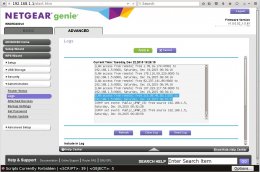Paul M. Cook
2015-12-23 03:55:35 UTC
Does this activity found accidentally in my home broadband
wireless router log seem suspicious to you?
Here is a screenshot of the suspicious log entries:
Loading Image...
When "I" log into my router, I see a line like this:
[Admin login] from source 192.168.1.16, Tuesday, Dec 22,2015 19:16:15
But, I see the following (suspicious?) activity in my log file:
[LAN access from remote] from 93.38.179.187:9000 to 192.168.1.5:9000, Saturday, Dec 19,2015 06:42:41
[LAN access from remote] from 177.206.146.201:9000 to 192.168.1.5:9000, Saturday, Dec 19,2015 06:41:54
[LAN access from remote] from 101.176.44.21:1026 to 192.168.1.5:9000, Saturday, Dec 19,2015 06:34:19
[LAN access from remote] from 181.164.218.29:9000 to 192.168.1.5:9000, Saturday, Dec 19,2015 06:34:19
[LAN access from remote] from 2.133.67.47:11233 to 192.168.1.5:9000, Saturday, Dec 19,2015 06:34:19
[LAN access from remote] from 186.206.138.72:62531 to 192.168.1.5:9000, Saturday, Dec 19,2015 06:34:19
[LAN access from remote] from 148.246.193.87:9000 to 192.168.1.5:9000, Saturday, Dec 19,2015 06:34:19
[LAN access from remote] from 195.67.252.183:49076 to 192.168.1.5:9000, Saturday, Dec 19,2015 06:34:16
[LAN access from remote] from 1.78.16.174:47891 to 192.168.1.5:9000, Saturday, Dec 19,2015 06:34:16
[LAN access from remote] from 178.116.59.223:9000 to 192.168.1.5:9000, Saturday, Dec 19,2015 06:34:16
[LAN access from remote] from 82.237.141.86:9000 to 192.168.1.5:9000, Saturday, Dec 19,2015 06:34:16
[LAN access from remote] from 107.223.217.54:9000 to 192.168.1.5:9000, Saturday, Dec 19,2015 06:34:11
[LAN access from remote] from 216.98.48.95:11020 to 192.168.1.5:9000, Saturday, Dec 19,2015 06:32:31
I don't know what this really means: "LAN access from remote".
Looking at the router wired & wireless list of devices, 192.168.1.5
seems to not be attached at the moment.
But, looking back, I can determine (from the MAC address) that it's
my child's Sony Playstation (which has "UPNP events" whatever they are):
[UPnP set event: Public_UPNP_C3] from source 192.168.1.5, Saturday, Dec 19,2015 06:32:28
[DHCP IP: (192.168.1.5)] to MAC address F8:D0:AC:B1:D4:A3, Monday, Dec 21,2015 12:26:18
[DHCP IP: (192.168.1.5)] to MAC address F8:D0:AC:B1:D4:A3, Tuesday, Dec 22,2015 16:17:47
[UPnP set event: Public_UPNP_C3] from source 192.168.1.5, Tuesday, Dec 22,2015 16:46:15
*****************************************************************
Can you advise me whether I should be worried that there are many
LAN accesses from a remote IP address to a kid's Sony Playstation?
*****************************************************************
wireless router log seem suspicious to you?
Here is a screenshot of the suspicious log entries:
Loading Image...
When "I" log into my router, I see a line like this:
[Admin login] from source 192.168.1.16, Tuesday, Dec 22,2015 19:16:15
But, I see the following (suspicious?) activity in my log file:
[LAN access from remote] from 93.38.179.187:9000 to 192.168.1.5:9000, Saturday, Dec 19,2015 06:42:41
[LAN access from remote] from 177.206.146.201:9000 to 192.168.1.5:9000, Saturday, Dec 19,2015 06:41:54
[LAN access from remote] from 101.176.44.21:1026 to 192.168.1.5:9000, Saturday, Dec 19,2015 06:34:19
[LAN access from remote] from 181.164.218.29:9000 to 192.168.1.5:9000, Saturday, Dec 19,2015 06:34:19
[LAN access from remote] from 2.133.67.47:11233 to 192.168.1.5:9000, Saturday, Dec 19,2015 06:34:19
[LAN access from remote] from 186.206.138.72:62531 to 192.168.1.5:9000, Saturday, Dec 19,2015 06:34:19
[LAN access from remote] from 148.246.193.87:9000 to 192.168.1.5:9000, Saturday, Dec 19,2015 06:34:19
[LAN access from remote] from 195.67.252.183:49076 to 192.168.1.5:9000, Saturday, Dec 19,2015 06:34:16
[LAN access from remote] from 1.78.16.174:47891 to 192.168.1.5:9000, Saturday, Dec 19,2015 06:34:16
[LAN access from remote] from 178.116.59.223:9000 to 192.168.1.5:9000, Saturday, Dec 19,2015 06:34:16
[LAN access from remote] from 82.237.141.86:9000 to 192.168.1.5:9000, Saturday, Dec 19,2015 06:34:16
[LAN access from remote] from 107.223.217.54:9000 to 192.168.1.5:9000, Saturday, Dec 19,2015 06:34:11
[LAN access from remote] from 216.98.48.95:11020 to 192.168.1.5:9000, Saturday, Dec 19,2015 06:32:31
I don't know what this really means: "LAN access from remote".
Looking at the router wired & wireless list of devices, 192.168.1.5
seems to not be attached at the moment.
But, looking back, I can determine (from the MAC address) that it's
my child's Sony Playstation (which has "UPNP events" whatever they are):
[UPnP set event: Public_UPNP_C3] from source 192.168.1.5, Saturday, Dec 19,2015 06:32:28
[DHCP IP: (192.168.1.5)] to MAC address F8:D0:AC:B1:D4:A3, Monday, Dec 21,2015 12:26:18
[DHCP IP: (192.168.1.5)] to MAC address F8:D0:AC:B1:D4:A3, Tuesday, Dec 22,2015 16:17:47
[UPnP set event: Public_UPNP_C3] from source 192.168.1.5, Tuesday, Dec 22,2015 16:46:15
*****************************************************************
Can you advise me whether I should be worried that there are many
LAN accesses from a remote IP address to a kid's Sony Playstation?
*****************************************************************